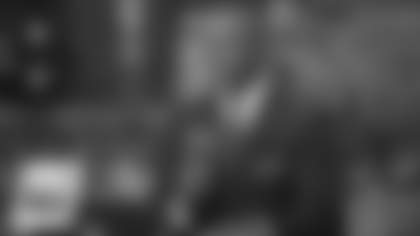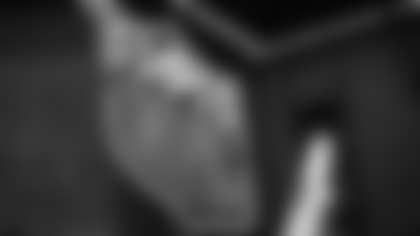EAST RUTHERFORD, NJ - The Coughlin Corner, Giants.com's exclusive weekly interview with head coach Tom Coughlin:
Q: We haven't spoken since the victory in Dallas 10 days ago. You opened your postgame news conference by saying, "You celebrate the wins." And that was after committing five turnovers and having to recover two onside kicks to secure the victory. Obviously, the win is great, but do those kinds of things mitigate your joy after a victory?
Coughlin: "A good part of what you categorize as managing the game is the prevention of that kind of a finish. Let's not take any credit away from them. Let's talk strictly about our team. The thing that we've done on a couple of occasions is we've allowed for the finish of the game to be something that didn't have to be. You could argue that they took it and drove it, what, (73) yards or whatever their one drive was in the game, but we gave up 20 points on turnovers, seven points on a punt return and one touchdown. So if you can somehow eliminate your errors, particularly when they invoke point blank field position, obviously you're better off. The object is to win. Don't ever forget the object is to win, so all the analyzing and all that stuff, if you can somehow improve - and we did improve and then we went backwards with the turnover thing. You don't want to start a game like we started it and you don't want to finish it like we did. Two and a half quarters, maybe three quarters, it was pretty good."
Q: You scored 31 points in a row…
Coughlin: "You don't want to take away from your defense and what they were able to accomplish."
Q: We talk every year that the bye is a change in routine for you. You go at it so hard all the time. The players were saying it was good to get a break. Do you come off the bye feeling at all like your battery is recharged?
Coughlin: "You do, because you have an opportunity to change your routine, you have an opportunity to spend time with your wife or with your family, and you can actually put 24-36 hours straight together that you're not at the office. So from that standpoint, it's all welcome. The major thing is that because the bye is where it is, the players get a chance to have two different seasons and it's a good thing. I'm one of those that, quite frankly, I like the routine. I like getting in it, and I like staying in it. And I get nervous when it's not the same, but that's me. And, you know what, by today I'm back on schedule myself, but you're always - you just have to have everyone focusing just like they played last Sunday. That's really what your concerns are - pick back up and go back at it without any attitude change. It's always nice to have that (bye), it's over, back to work."
Q: Did you watch some football?
Coughlin: "Sure."
Q: Did you watch just to see what else is going on around the league or because you were scouting a future opponent? Did you have your pens and your notebook out?
Coughlin: "Yes. I watched that Red Zone thing, so I saw a bunch of parts of games, important parts of games, saw some strategic situation stuff. I watched parts of Seattle-Oakland. I watched the second game, that New England game against Minnesota, watched the Sunday night game, although I was going back and forth with the World Series. But yeah, I watched. I watched a little bit of college football, too. I watched pretty much the second half of Florida-Georgia, which was a hell of a game."
Q: I know part of it was due to playing a Monday night game, but the players worked just once over the bye week, which is less than you usually have them in. Did they come back in a frame of mind and ready to go as you had hoped?
Coughlin: "I thought Monday was outstanding. Monday was outstanding. Not only were they on time, they were beyond on time. They were raring to go. They were energetic. I thought Monday they really did a good job."
Q: Now that it's November, do you consider this the time of the year when the teams start to sort themselves out in terms of which teams are legitimate playoff contenders?
Coughlin: "Well, it's going to take a bit more, but you get through Thanksgiving and you get a pretty good idea. You've got to really identify who you are and then play to who you are. It's a work in progress, believe me, and every week is a brand new challenge."
Q: You talked about the self-scouting that goes on during the bye week. Were you able to accomplish what you hoped, considering the players were in just once?
Coughlin: "Doesn't matter, coaches were in. Coaches do all the work. They just present what the message is. Maybe, for example, if you've studied the red zone defensively, it may be that you end up showing the players 25 plays, but in the meantime, you've watched seven games of red zone so that you can make a decision. Then you've also watched the best teams in the league in that area so that you're looking at the top three teams in the league in that area, plus your own team. Then you're presenting to your team on Monday, or in this case it could have been Wednesday or Monday. So they had two absolute film sessions with their coaches, which they had an opportunity to look at what we call the 'inverted, the worst-to-best list.'"
Q: By that do you mean you identify what you're not doing as well as you want to do, and you attack those first?
Coughlin: "Absolutely. That's what you do."
Q: How helpful is it to be able to do that during the season?
Coughlin: "It's very helpful because it starts right at the top where the coaches evaluate, where we evaluate it. Then, of course, whatever adjustments are handed down to the players and the players deal with it on a positional basis, the coaches deal with it as one of three areas - special teams, defense, offense."
Q: Osi Umenyiora this week was named the NFC Defensive Player of the Month of October. Is the new defensive scheme good for him? Has he dedicated himself to playing well in the scheme? Why are we seeing this transformation from a player who lost his starting job last season?
Coughlin: "Because he's an excellent player and he's playing very hard and he's focused. He's healthy. I think he's energetic, he's enthusiastic. He's got an excellent attitude - all of the above. The scheme, he's played well against the run and the pass. He's been a factor in both, and he's been a very good teammate. He's demonstrated leadership skills by virtue of the way that he plays, the extra work that he's done. So he's very deserving of this honor he's received. And it's a tribute to our defense, to our entire defense. You don't do it alone. There's no 'one man.' It's always about production and performance. And there is production and performance there."
Q: When Mathias Kiwanuka went down he was leading the team in sacks and questions arose about how to fill the void left by his loss. It seems as if Osi's been one of those guys that stepped up and done that.
Coughlin: "The great thing that we were able to accomplish is, obviously, we've schemed, by virtue of different personnel schemes where we could have our best players on the field at the same time. And that helps. And that was our intent the whole offseason."
Q: Deon Grant spent the previous three seasons in Seattle, where you play on Sunday. Every time there's a situation like this, you and the player get the question, 'Is he providing information about his former team?' Is there anything to that – can a guy who recently played for a team you are facing help you?
Coughlin: "Certainly he can, but this is a different situation in that it's a different coaching staff. He didn't play for Pete Carroll. So therefore in terms of sitting in the meeting room and knowing the philosophy and understanding how they attempt to attack similar teams, or this team, that's not the case here. So what he does know is the personnel that was there with him. But this team has made 200-and-some roster moves since they were hired in the spring."
Q: Can he offer tips on certain players?
Coughlin: "If they're there."
Q: Is that standard procedure for a coaching staff to talk to a player who's just played on that team?
Coughlin: "We used to sign him for a week. If we were in New York and Philadelphia cuts somebody, we brought him in for a week so we could talk to him - yeah, sure it is, naturally. But it's not the same this week because it's not the same set of circumstances."
Q: Along those lines, you do so much offseason studying of the opponent. Is much of that not applicable now because they've changed so much since you first started studying them? Coughlin: "No. We still studied and anticipated what their structure would be based on the experiences at USC (where Carroll coached previously) and the fact that we studied their coordinators, what they're known for. So it all starts with that. You say to yourself, 'Well, you really didn't have any tape to study.' Yes we did. Sure we did."
Q: You've been asked about Qwest Field, which has been identified by many as the most difficult NFL venue for a visiting team. In your mind is it any different than any other road stadium? Are there elements there that make it unique?
Coughlin: "Yes, it's loud. It's one of the more loud places that you ever play in. That plus the weather. Without making it more than what it is, you have to identify it for the practical purposes, exactly what you're up against. And as I said, they're 3-0 at home and they have incredible numbers at home and look at their divisional opponents. Look at Arizona coming in there, for example, San Francisco - they are familiar but yet things happen. So it has to motivate you and increase your interest to know what you're going to face just simply from the standpoint of the environment."





